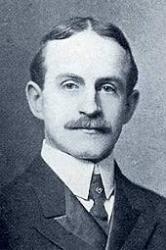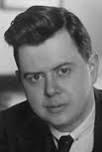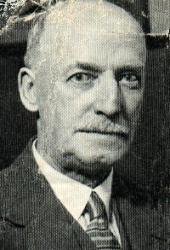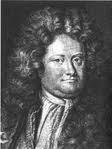Planning worship?
Check out our sister site, ZeteoSearch.org,
for 20+ additional resources related to your search.
- |
User Links
Person Results
‹ Return to hymnal





Export as CSV
Calvin Weiss Laufer

1874 - 1938 Person Name: Rev. Calvin W. Laufer Hymnal Number: R5 Composer of "[The Lord is in His holy temple]" in The Hymnal Presbyterian minister and hymnographer Calvin Weiss Laufer was born today in Brodheadsville, Pennsylvania in 1874. Following his graduation from Union Seminary in 1900 he was ordained into the Presbyterian ministry and led congregations in New York and New Jersey for several years.
Laufer had a generally cheerful outlook on his Christian life, and his first two books, Key-Notes of Optimism (1911) and The Incomparable Christ (1914) expressed that viewpoint. A review of the first book spoke of the "crisp and stirring note in these sermonettes which is well calculated to rouse the mind of readers and banish dejection." His books were popular in their time but today are seen as somewhat superficial.
He later began to work with the Presbyterian Board of Christian Education and became its editor of musical publications, producing books such as The Junior Church School Hymnal (1927), The Church School Hymnal for Youth (1928) and When the Little Child Wants to Sing (1935). He was also the associate editor of the Presbyterian Hymnal of 1933, a very popular book which was used in many churches for more than fifty years.
In 1932, his book Hymn Lore was published, which contained the stories of fifty hymns from The Church School Hymnal for Youth, with information about their writers and composers (much like this blog). He chose a broad range of hymns, some quite modern and others well-known and loved for centuries. Several of them were by his mentor and friend Louis F. Benson, who had edited the Presbyterian Hymnal of 1895 and its 1911 revision (and also wrote The Best Church Hymns). In the preface to Hymn Lore, Laufer wrote:
To live with hymns and to make them one's own is the only sure way of appreciating their literary beauty and spiritual power. (...) That the reading and singing of hymns may become less mechanical, more thoughtful and intelligent, and emotionally more effective, this volume is released to the public.
Laufer wrote both hymn texts and tunes himself, most of which first appeared in the books he edited but also had some life outside Presbyterian circles. This tune was written while Laufer was attending a conference in Kansas, though with no particular text in mind. Not long after, he hummed it to a friend, William H. Foulkes, who then wrote the text "Take thou our minds, dear Lord."
Laufer's tune was originally called STONY BROOK, but he changed it to honor a friend, William Ralph Hall. Little is known about the writer May Pierpont Hoyt. Her text is generally sung to the tune BREAD OF LIFE by William F. Sherwin, but since that tune is more known with "Break thou the Bread of life," this text could use a different one.
--conjubilant.blogspot.com/2010/04/
Calvin Weiss Laufer
Eliza F. Morris
1821 - 1874 Person Name: Eliza Fanny Morris (1821-1874) Hymnal Number: 252 Author of "God of pity, God of grace" in The Hymnal Morris, Eliza Fanny, née Goffe, was born in London in 1821, and married in 1849 to Josiah Morris. She gained the prize for a poem on Kindness to Animals offered by the Band of Hope. Her published works are he Voice and the Reply, Worcester, 1858, and Life Lyrics. She also edited a Bible Class Hymn Book, and contributed the words to School Harmonies, published by her husband. Her hymns in common use include:—
1. Come unto Me and rest. Christ's Invitation. From The Voice and the Reply, 1858, into the 1874 Supplement to the New Congregational, in an altered form.
2. God of pity, God of grace. Lent. This hymn in Litany form appeared in Pt. ii. of The Voice and the Reply, 1858, entitled "The Prayer in the Temple." From Miller's Singers and Songs of the Church, 1869, we gather that this hymn was written on the 4th of Sept., 1857.
3. 0 Thou, blest Lamb of God. Love for and Trust in Jesus desired. From The Voice and the Reply, 1858, into the Anglican Hymn Book, 2nd ed., 1871. [Rev. W. Garrett Horder]
--John Julian, Dictionary of Hymnology (1907)
Eliza F. Morris
F.-H. Barthélémon

1741 - 1808 Person Name: F. H. Barthélémon (1741-1808) Hymnal Number: 226 Composer (probable) of "BALLERMA" in The Hymnal French violinist, composer, teacher, he became active in England, playing in an Italian comedy orchestra and led a band. He wrote opera, ballet, theatre music and ballads, popular songs, masques, concertos and 6 symphonies.
John Perry
F.-H. Barthélémon
Sir Ernest MacMillan

1893 - 1973 Person Name: Ernest MacMillan Hymnal Number: 453 Arranger of "TEMPUS ADEST FLORIDUM" in The Hymnal Ernest MacMillan (Conductor)
Born: August 18, 1893 - Mimico, Canada
Died: May 6, 1973 - Toronto, Canada
The eminent Canadian conductor and composer, Sir Ernest (Alexander Campbell) MacMillan, began his organ studies with Arthur Blakeley in Toronto at age 8, making his public debut at 10. He continued his organ studies with A. Hollins in Edinburgh from 1905 to 1908, where he was also admitted to the classes of F. Niecks and W.B. Ross at the University.
Ernest MacMillan was made an associate (1907) and a fellow (1911) of London’s Royal College of Organists, and in 1911 received the extramural Bachelor of Music degree from the University of Oxford. He studied modern history at the University of Toronto from 1911 to 1914, before receiving piano instruction from Therese Chaigneau in Paris in 1914. In 1914 he attended the Bayreuth Festival, only to be interned as an enemy alien at the outbreak of World War I. While being held at the Ruhleben camp near Berlin, he gained experience as a conductor. He was awarded the B.A. degree in absentia by the University of Toronto in 1915. His ode, England, submitted through the Prisoners of War Education Committee to the University of Oxford, won him his Doctor of Music degree in 1918.
After his release, Ernest MacMillan returned to Toronto as organist and choirmaster of Timothy Eaton Memorial Church from 1919 to 1925. In 1920 he joined the staff of the Canadian Academy of Music, and remained with it when it became the Toronto Conservatory of Music, serving from 1926 to 1942 as its principal. He was also dean of music faculty at the University of Toronto from 1927 to 1952.
Ernest MacMillan was conductor of the Toronto Symphony Orchestra from 1931 to 1956, and of the Mendelssohn Choir there from 1942 to 1957. He also appeared as guest conductor in North and South America, Europe, and Australia. He served as president of the Canadian Music Council from 1947 to 1966, and of the Canadian Music Centre from 1959 to 1970. In 1935 he was the first Canadian musician to be knighted, an honour conferred upon him by King George V. He also received honorary doctorates from Canadian and USA institutions. He conducted many works new to his homeland, both traditional and contemporary.
--www.bach-cantatas.com/
Sir Ernest MacMillan
H. J. B.
1803 - 1871 Person Name: Rev. Henry J. Buckoll Hymnal Number: 487 Translator of "Come, my soul, thou must be waking" in The Hymnal =========
Buckoll, Henry James, M.A., son of the Rev. James Buckoll, Rector of Siddington, near Cirencester, Gloucester; born at Siddington, Sept. 9,1803. He was educated at Rugby and Queen's College, Oxford, graduating B.A.in 1826, and became Assistant Master at Rugby the same year. He took Holy Orders in 1827, and died at Rugby June 6, 1871. He was probably the editor of the first edition of the Rugby School Collection. In 1839 he edited a Collection of Hymns for the Rugby Parish Church, and in 1850 compiled, with Dr. Goulburn, a new edition of the Collection for the Rugby School Chapel. That collection contains 14 of his hymns, a few of which were translations from the Latin and German. His Hymns translated from the German were published 1842. It contained 67 translations from Bunsen's Versuch, 1833, most of which are in the original metres, and are annotated in this work under their first lines in German. Buckoll's hymns and trs. are mostly found in the hymn-books of the Public Schools.
-- John Julian, Dictionary of Hymnology (1907)
H. J. B.
Francis Duckworth

1862 - 1941 Hymnal Number: 32 Composer of "RIMINGTON" in The Hymnal Born: December 25, 1862, Rimington, Yorkshire, England.
Died: August 16, 1941, at his home Swanside in Colne, England.
Buried: St. Mary the Virgin Anglican Church, Gisburn, Lancashire. His gravestone bears the music of Rimington, and a plaque to his memory was placed above the doorway to the former Methodist Chapel in Stopper Lane, Lancashire.
When Duckworth was five years old, his family moved to the village of Stopper Lane, near Rimington. He had to leave school at age 12 to help in the family business. At age 20, he moved to Burnley, Lancashire, to work for a tobacconist cousin. Six years later, he returned to live at Colne, and in 1899 took a grocery business in Market Street, Colne.
Duckworth had an early interest in music, but received only three months of formal lessons. Shortly after arriving in Colne, he became deputy organist (later organist) at the Albert Road Methodist Church, serving until 1929. He composed numerous hymn tunes, 18 of them appearing in the Rimington Hymnal. His tune Rimington was sung by a massive congregation of British troops on the Mount of Olives after the surrender of Jerusalem during World War I.
--www.hymntime.com/tch
Francis Duckworth
Mrs. T. D. Crewdson
1808 - 1863 Person Name: Jane Crewdson (1809-1863) Hymnal Number: 295 Author of "There is no sorrow, Lord, too light" in The Hymnal Crewdson, Jane, née Fox, daughter of George Fox, of Perraw, Cornwall, was born at Perraw, October, 1809; married to Thomas Crewdson, of Manchester, 1836; and died at Summerlands, near Manchester, Sept. 14, 1863. During a long illness Mrs. Crewdson composed her works published as:—
(1) Lays of the Reformation, 1860. (2) A Little While, and Other Poems (posthumous), 1864. (3) The Singer of Eisenach, n.d.; and (4) Aunt Jane's Verses for Children, 1851. 2nd ed. 1855, 3rd 1871.
From these works nearly a dozen of her hymns have come into common use. The best known are, "O for the peace which floweth as a river," and "There is no sorrow, Lord, too light." In addition to these and others which are annotated under their respective first lines, there are the following in various collections:
1. Give to the Lord thy heart. 1864. Offertory.
2. How tenderly Thy hand is laid . 1864. Resignation.
3. Looking unto Jesus. 1864. Jesus All in All.
4. Lord, we know that Thou art near us. 1864. Resignation.
5. 0 Saviour, I have naught to plead. 1864. During Sickness. These plaintive lines were written a short time before her death.
6. 0 Thou whose bounty fills my cup. 1860. Peace.
7. The followers of the Son of God. 1864. The Daily Cross.
8. Though gloom may veil our troubled skies. 1864. Resignation.
--John Julian, Dictionary of Hymnology (1907)
======================
Crewdson, Jane, p. 268, ii. The following additional hymns by Mrs. Crewdson have recently come into common use through The Baptist Church Hymnal, 1900:—
1. For the sunshine and the rain. Harvest.
2. O Fount of grace that runneth o'er. Public Worship.
3. There is an unsearchable joy. Joy in God.
4. When I come with troubled heart. Prayer.
These hymns are all from her A Little While, and Other Poems, 1864.
--John Julian, Dictionary of Hymnology, New Supplement (1907)
===================
Crewdson, Jane, née Fox, p. 269, i. From her A Little While, and Other Poems, 1864, are:—
1. I've found a joy in sorrow. Power of Faith.
2. One touch from Thee, the Healer of diseases. Christ the Healer.
3. Tis not the Cross I have to bear. Faith desired .
--John Julian, Dictionary of Hymnology, Appendix, Part II (1907)
Mrs. T. D. Crewdson
Robert H. McCartney
1844 - 1895 Person Name: Robert H. McCartney (1844-1895) Hymnal Number: 311 Composer of "JESU DILECTISSIME" in The Hymnal
Robert H. McCartney
Friedrich von Canitz

1654 - 1699 Person Name: F. R. L. von Canitz Hymnal Number: 487 Author of "Come, my soul, thou must be waking" in The Hymnal Friedrich Rudolph Ludwig von Canitz, German poet and diplomant, was born at Berlin, November 27, 1654. He studied at the universities of Leyden and of Leipzig. After extensive travels in Europe, he was appointed groom of the bedchamber to the elector Frederick William of Brandenburg. In 1680, he became councilor of legation, then privy councilor, and was finally created a baron of the empire. He died in Berlin on August 11, 1699. His poems, which did not appear until after his death, are for the most part dry and stilted, based upon Latin and Greek models, but they were, nevertheless, a healthy influence and counterbalance to the coarseness of contemporary poetry. The spiritual poems, 24 in number, are his best work. They were first published anonymously after his death, edited by Joachim Lange as Nebenstunden unterschiedener Gedichte, 1700.
--The Hymnal 1940 Companion
=====================
Canitz, Friedrich Rudolph Ludwig, Freiherr von, son of Ludwig v. Canitz, privy and legal counsellor at Berlin; was born at Berlin, Nov. 27,1654, a few months after his father's death. After studying at the Universities of Leyden and Leipzig, he made in 1675-77 a tour in Italy, France, England, and Holland. In 1677 he was chosen gentleman of the bedchamber by the Elector Friedrich Wilhelm, and accompanied him in his campaigns in Pomerania, &c. He was then, in 1680, appointed chief magistrate of the district of Zossen and Trebbin, in the Mittelmark, and in 1681 counsellor of the Court and Legation. After a successful embassy to Frankfurt, 1682, he was appointed in 1683 chief magistrate of Miihlenhoff and Muhlenbeck. He executed many important missions under Friedrich Wilhelm and his successor Friedrich III., was a privy counsellor, and received in 1698 the dignity of Baron from the Emperor Leopold I. He died at Berlin, Aug. 11, 1699 (Koch, iv. 238-248; Allg. Deutsche Biographie, iii. 756, the latter dating his death Aug. 1). His hymns were first published posthumously, and without his name. They were edited by Dr. Joachim Lange, Rector of the Berlin Gymnasium, as Nebenstunden unterschiedener Gedichte, Berlin, 1700. Of the 24 religious poems, only 2 have continued in German common use, viz.:—
i. Gott, du lässest mich erreichen. Evening. 1700, as above, p. 6, in 6 stanzas. Translated as: "Father! hear me humbly praying" (beginning with st. ii. "Neige dich zu meinen Bitten "), by H. J. Buckoll, 1842, p. 99.
ii.. Seele du musst munter werden. Morning. This beautiful hymn, the mirror of his life, was first published 1700 as above, p. 3, in 14 stanzas of 6 lines. Included as No. 795 in Freylinghausen's Neues geistreiches Gesang-Buch, 1714, and as No. 471 in the Unverfälschter Leider 1851. The translations in common use are:—
1. Come, my soul, thou must be waking. A very good translation by H. J. Buckoll, omitting stanzas ii., iv., viii., given in a note at p. 456 of Dr. Arnold's Christian Life: its Cause, its Hindrances, and its Helps. London, 1841. The note is to a passage in Sermon vi., on Col. iii. 3, dated March, 1840, in which Dr. Arnold says:—
”Some may know the story of that German nobleman [v. Canitz] whose life had been distinguished alike by genius and worldly distinctions, and by Christian holiness; and who, in the last morning of his life, when the dawn broke into his sick chamber, prayed that he might be supported to the window, and might look once again upon the rising sun. After looking steadily at it for some time, he cried out, "Oh! if the appearance of this earthly and created thing is so beautiful and quickening, how much more shall I be enraptured at the sight of the unspeakable glory of the Creator Himself." That was the feeling of a man whose sense of earthly beauty bad all the keenness of a poet's enthusiasm, but who, withal, had in his greatest health and vigour preserved
the consciousness that his life was hid with Christ in God; that the things seen, how beautiful soever, were as nothing to the things which are not seen (p. 61).
Of the translation Dr. Arnold says, "For the greatest part I am indebted to the kindness of a friend," which means that portions (viz. st. i., 11. 1-3, and one or two expressions) are taken from the anonymous version of 1838 (see below). In 1842 Buckoll included it in his Hymns from the German, p. 36, altering stanza iii. 1. 3, xii. line 1. 1-3, and xiii. It is the text in Dr. Arnold's sermons which has passed into common use in the following forms, the references being to the translation of the German stanzas.
(1) St. i., v.-vii., ix.-xi., American Episcopal Hymns for Church and Home, 1860, altered.
(2) St. i., vi., vii., ix.-xii., in the Salisbury Hymn Book, 1857, and Kennedy, 1863. The Anglican Hymn Book., 1871, and the Evangelical Hymnal, N. Y., 1880, omit st. xii.
(3) St. i., vi., vii., ix.,xi., xii., considerably altered and with an added doxology in Sarum, 1868. This text in full, or abridged, is found in Church Hymns, 1871; Hymnary, 1872; Stevenson's Hymns for Church and Home, 1873; Baptist Hymnal, 1879, and others; and in America in the Episcopal Hymnal, 1871; Laudes Domini, 1884.
(4) St. i., vi., vii., ix.-xii., xiv., in Harrow School Hymn Book., 1855,1866; Marlborough College, 1869, &c.
(5) St. i., vii., ix., xi., with an added stanza in Book of Common Praise, 1863; and in G. S. Jellicoe's Collection, 1867.
2. Come, my soul, awake, 'tis morning. A good translation, omitting stanzas ii., iv., viii., by Miss Winkworth in her Lyra Germanica, 1855, 1st series, p. 210, and thence, retaining only the translations of stanzas i., vi., vii., xi.-xiii., in her Choral Book for England, 1863.
Another translation is:—
"Come, my soul! thou must be waking," in the British Magazine, July, 1838, p. 21. From this, st. i., 11. 1-3, and one or two expressions were adopted by Buckoll. [Rev. James Mearns, M.A.]
--John Julian, Dictionary of Hymnology (1907)
Friedrich von Canitz
Thomas Purcell
1582 - 1682 Person Name: Thomas Purcell Hymnal Number: A57 Composer of "[My soul doth magnify the Lord]" in The Hymnal
Thomas Purcell


 My Starred Hymns
My Starred Hymns

